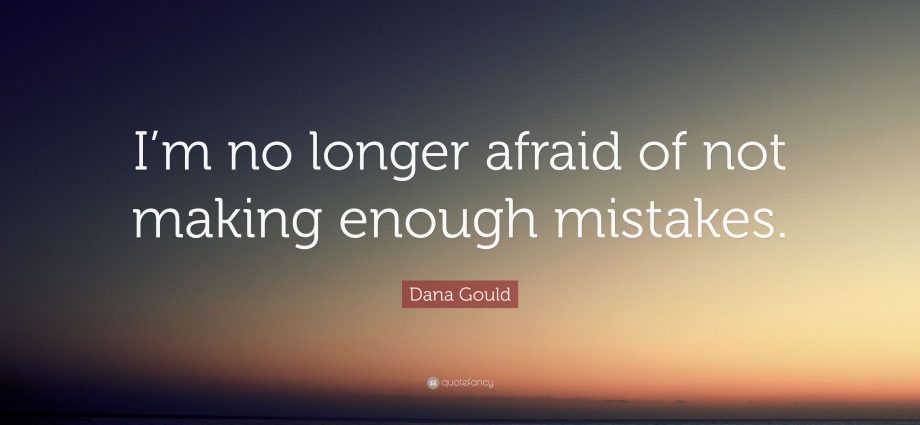Mistakes are a necessary part of life. They allow us to change and improve: “Try again. Fail again. Better err,” as playwright Samuel Beckett said. Writer Natalya Remish says that it helped her come to terms with her mistakes.
Now I know that it’s good to make mistakes, that without mistakes it’s impossible to acquire a new skill. But it was not always so. When I was still in school and was an excellent student, a mistake meant the end of the world — for example, a four instead of a five or, God forbid, a three instead of a four. It wasn’t until I got older that I freed myself from the fear of getting a low grade.
It happened in one moment. After graduating from school with a red diploma, I got the opportunity to pass not four, but two exams when entering the institute — only I had to pass them perfectly. I didn’t get a score and as a result passed all the exams. And then it dawned on me: all my school years I pulled these fives, so that it would be easier for me to go to college, but the lack of just one point equalized me with the rest of the students. How stupid it was to be afraid of getting a low grade for years, when your whole life passes in front of your nose, and you see only a “carrot” in the form of two exams!
It was much more difficult for me to work on the omissions that can be made in relationships with other people: for example, when you have different views on the situation, and you try hard to prove something in order to be right. At such moments, I reached a frenzy, convincing the interlocutor that my point of view was the only true one.
I didn’t even know that this is an unhealthy reaction to a mistake, behind which, perhaps, is the fear of guilt — if you agree with your wrong, then it is doubly hung on you. Therefore, you need to have a certain strength and courage to admit it.
Once during a session I had an interesting conversation with a psychologist. I described my conflict with a loved one and voiced who said what. You know, as it usually happens, when you reproduce your words in a calm voice, they are balanced and deliberate, there are no insults or attacks in them. And when you speak for another, then your voice sounds menacing and assertive, notes of aggression and insults slip through it. Even your eyebrows are raised.
“Why was it so important for you to prove your position?” the psychologist asked. His question seemed to douse me with ice-cold water. At first I was indignant, but then I thought about it and answered: “Because that would mean that I am right.” But I couldn’t explain what would happen if I was wrong. It all boiled down to one question: “What happens if you are wrong?”
I was completely lost and fell silent. It suddenly became clear that nothing would happen: I was simply mistaken in my position. This does not mean that I am not smart or a bad person. And most importantly, this does not mean that I am always wrong. It was a revelation for me that you can make a mistake, admit that you messed up firewood, and the world will not fall apart from this. And even if you are reproached for this mistake, you can once again confirm your mistake by saying: “Yes, yes, I really did something stupid.”
That day I realized that I was no longer afraid to make mistakes and I could forgive myself for my mistakes. Thanks to this, it became much easier for me to communicate with other people: I could make a mistake and not feel guilty or ashamed.
Failing is good
One day, a rather unfortunate thing happened. I was talking to my husband about my friend’s child, and at that moment the audio recording was turned on in our chat with her in the messenger. My monologue went to her. Although I didn’t say anything bad, I understand that it’s unpleasant to receive such a message — who likes it when they talk about you and important events in your life in the third person.
Previously, because of what happened, I would have started to panic, but here I just apologized to my friend and explained that it was important for me to discuss this with my husband — he is in a situation that is similar to her circumstances. I honestly admitted my mistake and was able to easily move on without looking back at what had happened.
When I became a mother, the teacher told my 4-year-old daughter that it is good to make mistakes. And this is exactly what she wanted to know about the attitude towards mistakes — and not to hear the wording like «You will succeed next time» or «You need to try harder.»
Now my daughter is not afraid to try new things and easily joins in any adventures. She is not afraid to make a mistake, because I can always remind her (as well as herself) that it is good to make mistakes. It’s the only way we learn something new.










